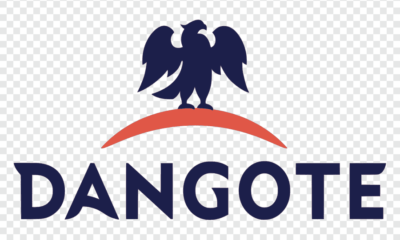NEWS
OPEC Reports Significant Global Market Shifts As Dangote Refinery Exports Fuel

The Organisation of the Petroleum Exporting Countries (OPEC) has highlighted the significant impact of Nigeria’s Dangote Petroleum Refinery on the global Premium Motor Spirit (PMS) market, particularly in Europe.
The refinery, which began operations in January 2024 with a capacity of 650,000 barrels per day, started PMS production in September.
This marked a turning point for Nigeria, a nation that had long depended on petroleum product imports.
READ MORE: Affordable Petrol: Ardova, Heyden Enter Bulk Purchase Pact With Dangote Refinery
Since production commenced, the refinery has been exporting petrol, diesel, and aviation fuel to markets across Africa and beyond.
In its report released on Wednesday, OPEC noted that the Dangote Refinery has substantially reduced the importation of petroleum products into Nigeria, reshaping global trade flows.
“The ongoing operational ramp-up efforts at Nigeria’s new Dangote refinery and its gasoline (petrol) exports to the international market will likely weigh further on the European gasoline market,” OPEC stated.
“Continued gasoline production in Nigeria, a country that has relied heavily on imports to meet its domestic fuel needs in the past, will most likely continue to free up gasoline volumes in international markets, which will call for new destinations and flow adjustments for the extra volumes going forward.”
Impact on Europe’s Gasoline Market
OPEC’s report indicated that Europe is already feeling the effects of this shift, with reduced gasoline exports to Nigeria leading to inventory builds at storage hubs in the Amsterdam-Rotterdam-Antwerp region.
The gasoline crack spread in Rotterdam against Brent crude saw a slight increase, supported by strong exports.
However, OPEC warned that the winter season’s lower demand could exacerbate the growing gasoline surplus in the Atlantic Basin, adding pressure to an already bearish market.
The report also revealed a rise in Nigeria’s crude oil production.
According to OPEC’s data from secondary sources, Nigeria produced an average of 1.507 million barrels per day (mbpd) in December 2024, a 12,000bpd increase from the previous month.
Government data showed a slightly lower figure of 1.485mbpd for the same period, aligning with figures from the Nigerian Upstream Petroleum Regulatory Commission.
The $20 billion Dangote Refinery has been ranked above Europe’s largest refineries in terms of capacity.
With its ability to process 650,000 barrels per day, it surpasses Shell’s Pernis refinery in the Netherlands (404,000bpd) and BP Rotterdam (380,000bpd).
Other major European refineries include the GOI Energy ISAB refinery in Italy (360,000bpd), TotalEnergies Antwerp in Belgium (338,000bpd), and the ExxonMobil Antwerp refinery (307,000bpd).
OPEC’s analysis underscores the refinery’s transformative potential. By reducing Nigeria’s dependence on imports and exporting refined products, the Dangote Refinery is reshaping global petroleum markets while enhancing Nigeria’s energy security.
NEWS
Data Protection Act Amendments: SERAP Threatens Legal Action Against National Assembly Leadership
The Socio-Economic Rights and Accountability Project (SERAP) has urged the Senate President, Godswill Akpabio and the Speaker of the House of Representatives, Tajudeen Abbas “to immediately withdraw the repressive bill for an act to amend the Nigeria Data Protection Act 2023, which seeks to regulate the activities of bloggers operating within the ‘territorial boundaries of Nigeria.’”
Details of SERAP’s position was contained in a statement on Sunday night in Abuja by its Deputy Director, Kolawole Oluwadare.
Olwadare posited that the SERAP urged Akpabio and Abbas “to ensure that any amendment to the Nigeria Data Protection Act promotes and protects the rights of bloggers and other journalists and does not undermine the fundamental human rights of Nigerians.”
The SERAP also urged Akpabio and Abbas “to end the imposition of unnecessary restrictions on the rights of Nigerians online and Internet-based content.”
ALSO READ: 2027: Okpebholo Banks On Edo, Delta States To Swing Tinubu’s Reelection
There is currently a bill titled “A Bill for an Act to Amend the Nigeria Data Protection Act, 2023, to Mandate the Establishment of Physical Offices within the Territorial Boundaries of the Federal Republic of Nigeria by Social Media Platforms and for Related Matters” (the “bill”).
The bill among others seeks to regulate bloggers including by requiring all bloggers to register local offices and join recognised national association for bloggers. The bill has passed its first and second reading in the Senate.
In the letter dated 12 April 2025 and signed by Oluwadare, the organisation stated thus, “This bill is a blatant attempt to bring back and fast-track the obnoxious and widely rejected social media bill by the back-door.”
The SERAP said, “If passed, the bill would also be used to ban major social media platforms—including Facebook, X (formerly Twitter), Instagram, WhatsApp, YouTube, TikTok, and independent bloggers if they ‘continuously fail to establish/register and maintain physical offices in Nigeria for a period of 30 days.’”
The letter, read in part: “Lawmakers should not become arbiters of truth in the public and political domain. Regulating the activities of bloggers and forcing them to associate would have a significant chilling effect on freedom of expression and lead to censorship or restraint.”
“The bill may also be used to block access of Nigerians to social media platforms. Blocking access to social media platforms is a flagrant violation of fundamental rights.”
“In addition to infringing on Nigerians’ right to access to information and digital technology, the proposed bill would also severely hamper business operations in the country, as many are reliant on foreign tools, services and technologies for their operations, as well as other sectors that rely on online information.”
“The bill would force international tech companies out of the Nigerian information landscape by requiring them to establish/register and maintain physical offices in the country. It would violate the requirement that the right to freedom of expression applies ‘regardless of frontiers.’”
“Should the National Assembly and its leadership fail to withdraw the bill to regulate the activities of bloggers, and should any such bill be assented to by President Bola Tinubu, SERAP would consider appropriate legal action to challenge the legality of any such law and ensure it is never implemented in the public interest.”
“The regulation of bloggers may be used to muzzle any dissenting voice and to silence any form of criticism or negative opinion on the policies and practices of the ruling party or the Government.”
“Authorities may also use the proposed regulation as a pretext to punish bloggers solely for the peaceful exercise of their human rights.”
“The bill seems to be directed at bloggers living in Nigeria and elsewhere, with severe adverse effects on the freedom of expression of a very wide range of individuals.”
“The proposed amendment to the Nigeria Data Protection Act, 2023 fails to meet the requirements of the Nigerian Constitution 1999 [as amended] and international human rights treaties to which the country is a state party.”
“The amendment, if passed would adversely affect unregistered bloggers operating ‘within the territorial boundaries of Nigeria.’”
“The proposed amendment may also be used to violate the rights to privacy, freedom of peaceful assembly and of association as protected by the Nigerian Constitution 1999 [as amended] and international human rights standards.”
“The proposed amendment is entirely inconsistent and incompatible with Nigeria’s obligations to respect and ensure the effective realisation of the right to freedom of opinion and expression. The amendment would disproportionality suppress a wide range of expressive conduct essential to a democratic society.”
“The bill would pose major barriers and threats to any individuals, especially journalists, human rights defenders and civil society organisations who may be critical of the government, as well as stifle democracy and media freedom.”
“Mandatory regulation of journalism is incompatible with the right to freedom of expression. There is no legitimate reason why bloggers – or in fact members of the general public – should be subject to mandatory regulation or licensing to express themselves.”
“Blogging plays an invaluable role in the free flow of information. Bloggers should never be required to register with the government or other official agencies to blog.”
“The bill may also be used as a pretext to force bloggers to disclose their sources. The right to protect sources is a cornerstone of freedom of the press, without which sources may be deterred from assisting the press in informing the public on matters of public interest.”
“The Nigerian Constitution and human rights treaties which the country has ratified protect everyone’s right [including bloggers] to maintain an opinion without interference and to seek, receive and impart information and ideas of all kinds, regardless of frontiers and through any media.”
“Nigerian authorities including the National Assembly have legal obligations to ensure an environment in which a diverse range of opinions and ideas can be freely and openly expressed and debated.”
“The requirement of necessity implies an assessment of the proportionality of restrictions, with the aim of ensuring that restrictions target a specific objective and do not unduly intrude upon the rights of targeted persons.”
“As noted in the 2005 Joint Declaration of the special rapporteurs on freedom of expression, ‘[n]o one should be required to register with or obtain permission from any public body to operate an Internet service provider, website, blog or other online information dissemination system, including Internet broadcasting.’”
“In their 2011 Joint Declaration on Freedom of Expression and the Internet, the four special mandates for the protection of freedom of expression highlighted that regulatory approaches in the telecommunications and broadcasting sectors cannot simply be transferred to the Internet.”
International News
Gabonese Voters Head To Polls In First Presidential Election Since 2023 Coup
Gabonese citizens lined up at polling stations on Saturday to cast their votes in a landmark presidential election, the first since the military ousted the Bongo dynasty in a coup last August.
Eight candidates are vying for the top job, but all signs point to junta leader General Brice Oligui Nguema — the man behind the August 30, 2023, coup — emerging as the frontrunner.
Oligui, who toppled Ali Bongo and ended 55 years of family rule widely criticized for corruption and economic mismanagement, has dominated opinion polls in the run-up to the vote.
In the capital, Libreville, snaking queues formed outside polling stations as voters turned out early.
READ MORE: Gabon Extends Investment Offer To Dangote Amid Nigerian Attacks
Among them was 30-year-old Aurele Ossantanga Mouila, who cast his ballot for the first time after finishing a night shift at a casino.
“I did not have confidence in the earlier regime,” Mouila told reporters, echoing the sentiments of many young voters hoping for change in the oil-rich central African nation.
Oligui, who served as transitional president while civilians drafted a new constitution, swapped his military uniform for campaign attire as he seeks a seven-year mandate.
He faces seven challengers, including his main rival, former Prime Minister Alain-Claude Bilie By Nze, a longtime insider under Ali Bongo who now brands himself as the face of a “complete rupture” from the past.
Despite Oligui’s promises of reform, critics question his commitment to breaking with the old system, noting his deep ties to the Bongo era.
His campaign slogan, “C’BON” — a clever wordplay blending his initials with the French phrase for “It’s good” — has been plastered across Libreville, while rival candidates struggle for visibility.
As roughly 920,000 registered voters cast their ballots, the election is taking place against a backdrop of pressing national issues.
High unemployment, failing infrastructure, regular power outages, and soaring government debt — projected to reach 80 percent of GDP this year — have fueled public frustration.
Analysts, like political observer Neyer Kenga, say the vote represents a critical test for Gabon’s return to civilian rule and constitutional order.
“Today all Gabonese are firmly in favour of a democratic game that is played within the rules,” Kenga noted, adding that the outcome remains uncertain in a nation scarred by post-election violence in 2009 and 2016, as well as last year’s coup.
The interior ministry has pledged a “transparent ballot” and results are expected by Monday. Meanwhile, Oligui remains confident of victory.
“The builder is here, the special candidate, the one you called,” he declared at his final rally, as music and dancing filled the streets of Libreville.
NEWS
‘Hands Off Our Campus!’ — NANS Warns SSANU Over Protest Threats At FUOYE
The National Association of Nigerian Students (NANS), Southwest Zone D, has cautioned the Senior Staff Association of Nigerian Universities (SSANU) against actions capable of disrupting academic activities at the Federal University Oye Ekiti (FUOYE).
In a statement released on Saturday in Ado Ekiti, the student body condemned what it described as “veiled threats” by SSANU Western Zone to mobilize its members for industrial action or protest at FUOYE, following the university’s handling of a sexual harassment allegation against the institution’s Vice Chancellor, Prof. Abayomi Fasina.
The controversy stems from an extraordinary meeting of FUOYE’s Governing Council, which exonerated Prof. Fasina of the sexual misconduct allegation, while two local SSANU leaders were found guilty of misconduct.
READ MORE: NANS Demands Probe Into NYSC’s Non-Payment Of N77,000 Allowance
The council directed the implicated unionists to issue written apologies and undertakings to abide by university regulations within seven days, although their suspensions were lifted, with a forfeiture of half salaries for the period under review.
In reaction, SSANU’s National Vice President for the Western Zone, Abdussobur Salaam, rejected the council’s decision and announced plans to mobilize union members across 26 universities for a possible industrial action until their demands were addressed.
Responding, NANS leaders Taiwo Owolewa (Coordinator), Olutunde Oluwole (General Secretary), and Eromidayo Kuku (Public Relations Officer) warned that any attempt to destabilize the academic environment would be met with firm resistance from the student body.
“Nigerian students and the entire NANS structure in the South-West and beyond will resist such moves with even greater mobilization across our over 70 tertiary institutions comprising more than 300,000 students,” the statement read.
They emphasized that students would not stand idly by and allow any group or union to jeopardize the academic future of over 50,000 students at FUOYE.
“This is not a threat; this is a declaration of readiness to protect the academic future of Nigerian students. FUOYE or any of our institutions in Southwest is not a battleground for political vendettas or union showdowns,” the student leaders asserted.
While urging SSANU to seek lawful and peaceful avenues to resolve grievances, NANS also called on stakeholders to step in and prevent any action that could compromise the stability of the institution.
Additionally, the association aligned itself with the conclusions of the university panel that cleared the Vice Chancellor of wrongdoing, citing corroboration from both the Nigeria Police Force and the testimonies of the concerned parties.
“Our foremost concern remains the welfare of students,” NANS stated, endorsing the Governing Council’s plans to establish a Peace and Reconciliation Committee as well as onboarding and reorientation programmes aimed at fostering a positive institutional culture.




















